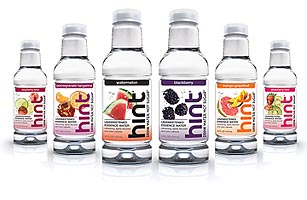
Hint Unsweetened Essence Water
(2 of 2)
Getting schooled in the beverage business has also meant mastering a steep learning curve. One early error: Hint launched with a bottle that was an inch shorter than the standard, and although the unique packaging won awards, the stunted size didn't appeal to consumers. Later, a line specifically targeting kids proved confusing. Flavors required tweaking. Mango-grapefruit took 12 tries. They've improved by leaving a large "flavor house" and becoming more involved in the details to customize the flavors: Now, when they launch a new flavor they get it right on the first try 30% of the time.
Industry watchers say it's a great time to be an emerging beverage company because consumers are looking for new options, but it's also a time marked by fierce competition. In addition to the industry giants with massive distribution and marketing muscle, there are several small players vying to dominate the unsweetened flavored water category, estimated at $40 million. Metromint, also launched by a married couple in San Francisco, was recently picked up by Starbucks and Ayala's Herbal Water, run by a pediatrician and mom, was bolstered by an investment from Sunsweet. Owater, founded by Tom First, co-founder of Nantucket Nectars, has won endorsements from athletes such as Tiki Barber and is carried at Au Bon Pain cafes nationwide.
But perhaps the biggest challenge isn't any competitor, but the American consumer and our addiction to sugar and sweet flavors. A decade ago, Darius Bikoff launched Hint precursors known as Glaceau Fruitwater and later, Essencewater. While distributors and industry consultants thought Bikoff had a hit, Americans didn't go wild for the subtle flavors. (Distributor Sadowsky remembers taking his Fruitwater to the Worcester, Mass. food bank.) Bikoff focused on his next big idea Vitaminwater, a sweeter blend that contains sugar, and which was acquired by Coke in 2007 for $4.1 billion, making it one of the beverage industry's greatest success stories. More recently, in 2009, Coke shuttered its homegrown offering, Dasani Essence. "It was a very niche area there wasn't great demand for the product," says a spokeswoman for Coca-Cola North America. It is now focused on artificially sweetened flavored water.
"We say we want less sugar but we always reject it," says Gerry Khermouch, editor of Beverage Business Insights. "These products have never taken off. It's a conundrum." Tom Pirko, founder of Bevmark, a food and beverage advisory firm in Santa Barbara agrees, calling the mystery the "riddle of the sphinx/drinks," but adds that the time is ripe for change. "There is a health epidemic and news about obesity and diabetes are shaking the consumer; the consciousness is changing," says Pirko. "Hint plays right into the heart of this growing emotion."
The recent legal brouhaha over Vitaminwater's alleged false healthy claims may be steering people towards products like Hint. "People are beginning to realize how many vitamins it doesn't have and how many calories it does," says Goldin, who sells her product under the mantra "drink water not sugar" and who is quick to provide scary sugar factoids. "Replace a 12-ounce sugared beverage daily with water and cut 3,650 tspns of sugar a year from your diet—that's 38 pounds of sugar a year," proclaims a recent tweet. Hint is especially focused on changing the unhealthy habits of kids. In February it launched a campaign to eliminate sugar-filled drinks in schools and several school districts in New York and California have already replaced soda with Hint. This summer, Hint was endorsed as a healthy option under guidelines given by the Alliance for a Healthier Generation, an initiative by the Clinton Foundation and the American Heart Association's program, which seeks to rid schools of junk food.
For Hint, it's all part of a mission to help people live healthier lifestyles. "We are trying to change an industry that is so gross and so broken," says Goldin. "The food and beverage environment can be a cleaner and more transparent place for the consumer." Goldin anticipates that Hint will expand beyond beverages, alluding to a possible foray into yogurt or chips. She also reveals that she keeps contacting McDonald's, "hoping to keep the dialogue going." (Says Theo: "Sometimes it's a monologue.") Still, Goldin's goal remains undiluted: "Hint is just at its starting point," she says. "Someday we will help people make the change."